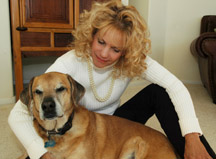After taking Aurum 200c, Ruth spent a week with a cold, and then her sadness cleared like an elementary school blackboard on Friday afternoon. We repeated the Aurum 200c twice more over the course of two months when she had reached a plateau or felt some twinge of the emotional ache returning. But after the final dose, she seemed to hit her stride.
Thankfully, Ruth has been well ever since. It has now been two years. I heard from her a while back and she was happy, has stayed off drugs, has a boyfriend, joined a dance troupe, and lives with fullness so that she can make her home wherever she finds herself. She has begun to work on the task of forgiving her father.
This is the magic of homeopathy.
The most effective tool of all
I have been a practicing counselor and author for a long time. I've
lectured on mental health issues and worked with patients all over the country
on everything from addiction to trauma and anxiety. I've learned and used
techniques from hypnosis to eye movement desensitization and reprocessing to
cognitive behavioral therapy. My tool kit was by all accounts full. But it
wasn't really effective until I added the practice and philosophy of classical
homeopathy. Even when I don't use a homeopathic remedy, the work I do and the
questions I ask are different and better because of my training in homeopathy.
In learning to be curious, to seek out answers instead of waiting for them to
be delivered, I have learned to see not only the pathology but the person.
Homeopathy is not just a matter of memorizing the remedies or being terribly clever about using the repertory. The really important, difficult work is seeing the truth. This is still a much harder task than I would like. But it is easier when I am truly present with someone and can listen to what every part of them is telling me.
I often explain it to my patients this way: "Think of a
light moving through a prism. It comes out as a full array of colors"that's
you. Who you are is expressed as much in your toes as in your greatest ideas,
in the way you wake up as much as in the way you dance (or don't!). But it's
always you. The "You' in you is always there, like the theme in a piece of
music. Whether it's the cellos or the piccolos--the melody runs through every
note.
That is what a vow does. It shapes us over the course of a lifetime. It determines not only what we do and say or how we love and play, but how we receive the world around us. So, where some people only see a mound of diffuse mental symptoms, I see the notes and pauses of a score scribbled over a lifetime. When I listen carefully, I hear music.




